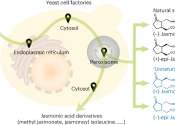A mutant plant with a counting disability
The newly discovered dyscalculia mutant of the Venus flytrap has lost its ability to count electrical impulses. Würzburg researchers reveal the cause of the defect.

The newly discovered dyscalculia mutant of the Venus flytrap has lost its ability to count electrical impulses. Würzburg researchers reveal the cause of the defect.
Plants & Animals
Jan 23, 2023
1
381

Organogenesis, an important aspect of flowering, helps reveal key processes of plant development such as the formation of floral organs, attainment of reproductive capability, and abscission leading to seed and fruit development.
Plants & Animals
Feb 7, 2024
0
2

A research team led by Prof. Luo Xiaozhou from the Shenzhen Institute of Advanced Technology (SIAT) of the Chinese Academy of Sciences (CAS) and Prof. Jay D. Keasling from the University of California, Berkeley, has developed ...
Cell & Microbiology
Nov 15, 2023
0
97

Plants are not exposed to herbivores without defenses. When an insect feeds on a leaf, thereby wounding it and releasing oral secretions, a signaling cascade is elicited in the plant, usually starting with a rapid increase ...
Evolution
Aug 21, 2023
0
48

A mechanism behind how plants can develop long-term immunity to stress has been discovered by scientists at the University of Sheffield.
Plants & Animals
Mar 7, 2023
0
85

The flash of lightning and the dance of auroras contain a fourth state of matter known as plasma, which researchers have harnessed to produce a gas that may activate plant immunity against wide-spread diseases.
Biotechnology
Aug 19, 2022
0
31

Insect-eating plants have fascinated biologists for more than a century, but how plants evolved the ability to capture and consume live prey has largely remained a mystery. Now, Salk scientists, along with collaborators from ...
Plants & Animals
Jul 11, 2022
0
128

A 30-year-old genetic mystery has been solved. It has previously been established that touch can trigger stress reactions in plants. However, the molecular models for explaining this process have been quite spartan so far. ...
Molecular & Computational biology
May 23, 2022
0
100

Given the sheer number of potential enemies, plants are resistant to most pests, even if they can cause damage to other plants. In a new study published in the journal Science, researchers at the Max Planck Institute for ...
Plants & Animals
Feb 3, 2022
0
105

Plants produce the hormone jasmonic acid as a defense response when challenged, making their leaves taste bad to predators. Biologists want to determine whether biological precursors and other variants of jasmonic acid lead ...
Biotechnology
Jun 1, 2020
0
89